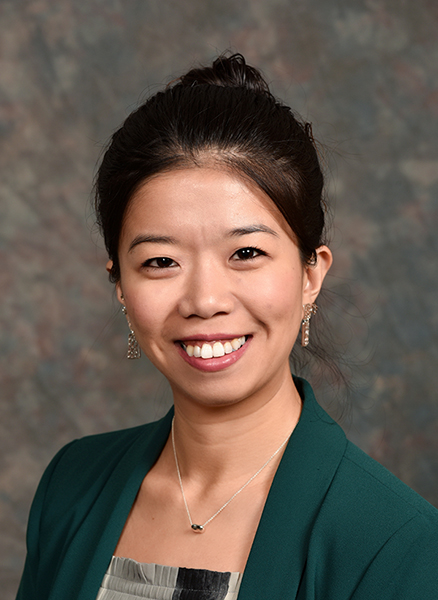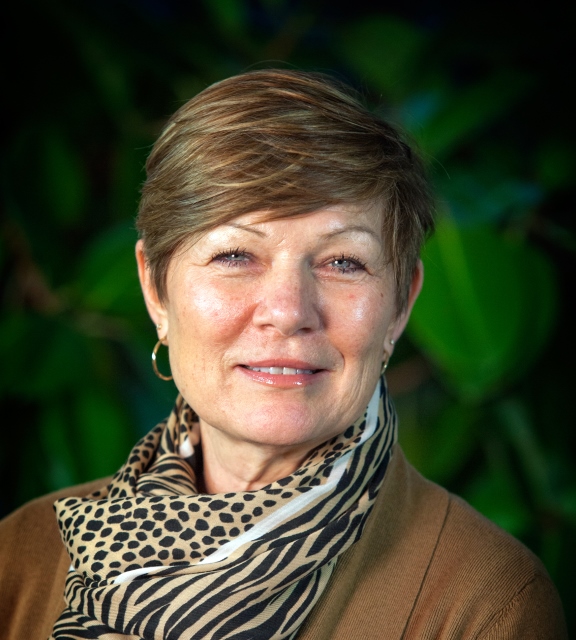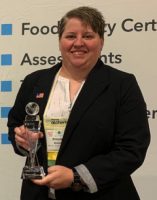John Carter, area Europe quality director at Ferrero, has been devoted to diversity for more than 20 years. This time, it’s our pleasure to speak with him to hear his perspective on female professionals in the industry and how his male peers can help encourage a diverse environment and break unconscious bias.
His background in engineering, along with an MBA, has given him a scientific mindset when making decisions. After his first job with Campden BRI in the UK, John had positions at Kraft/Mondelez, Metro, Danone, and is now at Ferrero; in that time, he has gained tremendous food safety and quality experience. As is the case with many food safety professionals, John is proud to be part of an industry where he can use his technical knowledge to protect public health. “Food safety is not competitive; it’s a global collaboration, and a rewarding field,” he said.

John advises young professionals to avoid limiting themselves to one function. Explore different functions within a business; if you have been working within food safety for more than 20 years, you might not focus on the full scope of the food industry or food operations. To move forward into an advanced position, especially toward a senior management position, John explained that one should have a helicopter view of the business and vision. For example, moving from food safety to the quality management system, to operations is one option, allowing you to see the big picture. “Don’t hesitate to explore other functions. At Kraft, we used to say that to be a senior executive, you need to do 2, 2, and 2, meaning you need to do two countries, two categories, and two functions. Afterward, you can say you know the company,” he said.
In the future, John hopes to see at least a 50-50 ratio of male-to-female professionals, or an even higher ratio of females.
Melody Ge: What is your most important piece of advice to aspiring—as well as current—food safety professionals?
John Carter: Walk the line and find the balance. To illustrate my point, I’ll tell a story about my experience at one company involving a recall of raw milk cheese due to positive E. coli 0157. It was quite a significant issue, but no one got sick, and we had the products withdrawn from the market. One of the questions we had at that time was why we were selling raw milk cheese. Why don’t we just use pasteurized milk and cheeses? However, the reality is that, in Europe, raw milk cheese is in the DNA of some countries. It would be hard to even think about their diet without raw milk cheese. So there must be another way to manage food safety apart from just pasteurizing the milk. How do you do it? What else can you do? Where are the risks? We, as food safety professionals, must answer these questions. So walking the line between the commercial impact and the risk is crucial. Hence, the skill of the job is to know how to make the decision properly. It’s very easy to say ‘no’ to everything, but it might not be business friendly.
What’s more important is to say ‘yes’ after a thorough risk assessment—for example, ‘yes but…’ or ‘yes with a condition of …’ Every day, we are confronting this issue. The skill in food safety and quality is to give these conditional yesses. It’s based on a logical, scientific and rational assessment of risks. The partnership with the business is that they see us as an enabling function rather than a blocking function.
Ge: Let’s focus on female professionals—any particular pieces of advice for them?
Carter: Be confident! Between men and women, there is this confidence vs. competency conundrum. Typically, men behave more confidently. ‘Can you do this? Yeah, sure!’; in contrast, for women, ‘Can you do this? Oh, well let me check, I am not sure.’ They may have the same level of competence, and maybe even the women are more competent (it’s the reality). I read a book recently called Why Men Win at Work by Gill Whitty-Collins. Gill also mentioned this in her book: We shouldn’t expect men to be less confident; we should encourage women to be more confident. (On the other hand, if I look at the women in my team, typically their competency is very high!)
The other thing is to be who you are, and keep up the competency. I will use emotional behavior as an example. A female quality manager who reported to me once was criticized by a senior colleague (a male) for being too emotional. I am more critical of the colleague, not the quality manager, because I think we as male managers need to understand emotional behavior instead of removing that behavior. She is emotional for a reason. A man’s way of dealing with that emotion might be to get angry, while a woman’s way might be to shed some tears. But the root cause is the same issue and has the same action plan. Thus, it’s important to get over the differences and manage her talent—and not label it, showing this kind of emotion as a weakness. For example, I would like to believe that crying is not the point; it’s a different way of dealing with stressful situations. You need to look for the root cause of the stress and address the stress, not judge the symptoms.
Ge: Do you believe in a glass ceiling for female professionals?
Carter: I was fortunate that I had an excellent female boss at Kraft. She believed that we needed 50/50 gender equality—that 50% of plant managers should be female, 50% of country managers should be female, etc. I had a good experience at Kraft in developing and seeing many female professionals thrive. In that specific environment, I wouldn’t agree that there was a glass ceiling for females; however, I see it elsewhere for sure. In other companies, I have been thinking about how we can get more females in director levels. It is not easy to just promote at the management level because it has to be a structural change. The system change must happen. Part of what I am trying to do right now throughout my career is address the structural problem. And senior men need to be part of the solution.
On the other hand, there are many aspects to a promotion. One needs to be good, really resilient and lucky. Luck is essential, and the right time and place are important. If you are good enough and you have been overlooked, then maybe you should go somewhere else (It is that simple). I think, in today’s world, the opportunities are there, and the recognition is there. It is the right timing now to break the ceiling. Every company I have ever worked in has started to change, so now is a good time to be in that situation.
Ge: Can you share a story that has impacted you and still inspires you today?
Carter: I remember meeting someone at Kraft, and she was doing something related to IT at that time. She was managing something related to complaints and was in a position where she got to know the quality function in the company. When we had an open role internally for a quality auditor, she applied for it. I was quite surprised when she came to me, because she was not qualified from a technical perspective. But when she told me she was interested, it inspired me. I assigned her to the factory in South Africa for training, and suddenly, she moved from a desk in Munich to a factory floor to deal with the operations and team in South Africa. Of course, the factory environment is challenging, and there is no easy factory. However, she was very talented and really loved it. (It could have gone the other way, but she nailed it). Then, she returned from this assignment and became a QA manager, eventually overseeing the whole SAP QA system. Of course, this is because of her background in the IT department before the QA training. Suddenly, she had this kind of unique knowledge of something, and no one understood the computer system or QA better than her. If she hadn’t come to me in need of a change, and if I hadn’t been inspired to provide a chance to an enthusiastic person, her path may have been different. So, go for it! Once the tough times pass, you will enjoy it, and then the sky is the limit.
Ge: What’s your opinion on unconscious bias?
Carter: I am pretty excited about this topic—I think it addresses the root cause of many issues. I have been working on diversity for the last 20 years; but only over the past couple of years have I started thinking about unconscious bias. The unconscious bias part is relatively new, but I think it may help us address the root cause of many of the behavior issues that we see in today’s world. Gill also mentioned this in her book. She was a senior vice president at P&G, and until she noticed unconscious bias, she was quite happy. So, this happens to females as well as to men. You suddenly see it, and then you see it everywhere.
I can give you another example of my own. Not so long ago, in one of the companies where I have worked, there was an internal announcement about senior leadership changes. When it was announced, I saw a list of 20 names on the screen and didn’t notice that they were all men until our diversity council had a meeting to discuss this issue. The council leader pointed out that we have zero female representatives among the twenty. Wow, I was shocked! I am a man and I genuinely care about diversity, yet my unconscious bias is that I didn’t even notice that there wasn’t a female name on the list. I had to reflect. With this unconscious bias, which we can all have, we need to work harder together.
I think there is a food safety parallel: perhaps the situation is a lot like when we first addressed food fraud at the Global Food Safety Initiative (GFSI). Food fraud is a crime, and it’s possibly the oldest crime in the food industry—centuries old. Although legislation has been in place for years, it seemed that little concrete had been done about it; but after the melamine crisis in China, and various similar issues, we finally got a political imperative to address it in a systematic way. We now have GFSI guidance documents and CPOs, and we have the technology with DNA testing to guarantee authenticity. Finally, we have the tools and political will to ‘do something’ and really address the issue.
So, coming back to this topic of diversity and unconscious bias – in my opinion, this is the “food fraud” of society; it has been ongoing for a long time, and now is the time for us to make a change. We have to ‘do something’. Every company and culture has its own issues and characteristics and all cultures are different (diverse, right?) but when you have the willingness and tools to change an environment, you can take a series of steps to make that change. The time is right, but having awareness comes first.
Ge: Any last bits of advice for our WIFS group members?
Carter: I read a little book about 40 years ago, and the book’s thesis was that there are two things you need to do and have in life. One is that you need to have fun and enjoy life; the other is to learn as much as possible. In the course of mentoring many talented folks over the years, I have added two other things to this list; have patience and courage.
Patience, courage, learning, and fun! Try to live your life with those things in mind.








